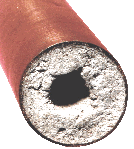What is hard Water?
 Water is considered to be “hard” if it contains calcium and magnesium. While most natural water supplies contain a certain amount of these two elements, most supplies range from 3 grains per gallon (gpg) to 50 gpg (or 51.3 mg/l to 855 mg/l). These substances leave a “film” or scale on surfaces that come in contact with the water. If left untreated, hard water will form lime scaling in pipes, water heaters, boilers, air conditioning systems, etc., causing inefficiency and sometimes even permanent damage. For example, in water heaters just one-sixteenth of an inch of scale can reduce a water heater’s efficiency by up to 15%. In fact, scale acts as an insulating material and thus lowers heat conduction.
Depending on the amount of water hardness, soap consumption can increase by as much as 90%. Hard water can also result in the formation of soap curd that adheres to cloth fibers, glassware, dishes and other products and leaves an itchy or sticky build-up behind.
Water is considered to be “hard” if it contains calcium and magnesium. While most natural water supplies contain a certain amount of these two elements, most supplies range from 3 grains per gallon (gpg) to 50 gpg (or 51.3 mg/l to 855 mg/l). These substances leave a “film” or scale on surfaces that come in contact with the water. If left untreated, hard water will form lime scaling in pipes, water heaters, boilers, air conditioning systems, etc., causing inefficiency and sometimes even permanent damage. For example, in water heaters just one-sixteenth of an inch of scale can reduce a water heater’s efficiency by up to 15%. In fact, scale acts as an insulating material and thus lowers heat conduction.
Depending on the amount of water hardness, soap consumption can increase by as much as 90%. Hard water can also result in the formation of soap curd that adheres to cloth fibers, glassware, dishes and other products and leaves an itchy or sticky build-up behind.
What is the difference between softening water and filtering water?
Filtering water involves removing small particles or gasses like sediment, manganese, iron, chlorine or hydrogen sulfide from a water supply . By passing water through a “filter bed,” these particles (in sizes as small as 10 microns)- are trapped and clean, water passes through the bed. Periodically the filter must be backwashed. That is the unit must be taken off-line and the flow of water through the filter reversed. This reverse flow is then directed to a drain in order for the trapped sediment to be rinsed out of the filter bed. Once completed, the filter is returned to an on-line status. Softening water involves a process called “ion exchange” to remove dissolved minerals – like calcium, magnesium, -and iron- that are too small to be trapped in a filter bed. Water softeners use polystyrene resin beads for this process. As water enters the tank, dissolved calcium and magnesium are attracted to the resin, removing them from the water supply. Eventually the resin beads will be unable to remove more calcium and magnesium minerals until they are regenerated. The regeneration process uses salt to rinse the resin beads of the accumulated calcium and magnesium. Once the regeneration process is complete, the water softener is again ready to provide soft water. To find out what’s ailing your water, contact your Beaumont Culligan Dealer.Treated Water
(usually through reverse osmosis or filtration) can substantially improve the taste or appearance of your food and beverage products. Your ice can be clearer and more appealing. Your drinking water can be free of chlorine. But did you know that using treated water may allow you to lower soft drinks syrup rations Treated water may also help your business comply with the recommended specifications from your beverage line suppliers. Add that to the increased potential for customer satisfaction and the decision to treat your business’ water is easy. How will a water treatment system improve my business manufacturing and technical processes? With virtually any business that uses hot water or delivers products and services involving machinery or manufacturing equipment, using a water system will save you time and money. From schools to photo processors, hotels to car, washes businesses stand to profit from investing in a water treatment system. Treated water causes less equipment wear and less downtime on the job – and extends the life of the technologies that drive your business.How do I know what product is right for me?
For starters you can browse our product section in Commercial Solutions, or you can send us an Information request to receive our commercial product catalog and specification CD. Having your water tested will help you determine your exact needs. Your local Culligan Man will also help guide you through the selection process For example, assistance in interpreting the water analysis results, your type of business or industry and the size of your business will influence the size or type of equipment necessary for remedying your water problems.What should I look for in purchasing a water treatment product?
Here are some helpful considerations you may want to take into account when purchasing a water treatment system.- Do I know what water conditions I need to address?
- Is there now and will there be local sales and service support?
- Am I supported by a water treatment firm with expert knowledge concerning water and my business?
- Does the dealer have customer references available?
- Will the system I purchase be large enough to meet present and future needs?
- If I decide not to buy, is leasing an option?
- If I elect to lease, can the installation costs be included in the lease offer?
- Did the salesperson answer all questions regarding design function, initial purchase cost and any ongoing operational costs?
- Is installation included in the price?
- Does the dealer offer preventative maintenance services or other after-sales services?
- Does the equipment carry a specific written warranty?
